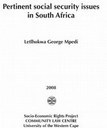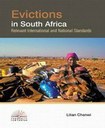
Latest resources





This issue focuses on the non-implementation of judicial enforcement of socio-economic rights; increasing the minimum essential amount of water; improving the administration of social assistance services and other issues related to socio-economic rights.
Municipalities are key institutions in bringing about sustainable human settlements that respond adequately to the challenges and implications of the HIV and AIDS epidemic.
The Constitution provides that “everyone has a right to administrative action that is lawful, reasonable and procedurally fair”. This entitlement extends to municipal employees and must therefore be reflected in municipal labour and administrative practices.
The Municipal Demarcation Board (MDB) recently confirmed that Msunduzi, Mangaung and Buffalo City municipalities are to become category A (metropolitan) municipalities, bringing the total number of metropolitan municipalities to nine.
The Children’s Amendment Act (Act 41 of 2007) was signed into law on 18 March this year. The Act, together with draft regulations recently published for public comment, represents the final step in the arduous, ten-year journey of reviewing the Child Care Act.
Over the past weeks, the impact of the leadership change in the African National Congress on government has become patently visible. The most important change was obviously manifested in the resignation of the President, three provincial premiers and a number of national Cabinet members, including the Minister for Provincial and Local Government.
The powers and functions shared between provincial and local government have traditionally been a source of great confusion and concern for municipalities. Ill-defined powers and functions have often led to duplication, inefficiencies and arguably even deterioration in the delivery of services to communities.
Generally, a municipality may only levy taxes (other than property rates) in terms of empowering legislation. The Municipal Fiscal Powers and Functions Act (Act 12 of 2007) outlines a procedure whereby a municipality may apply to the National Treasury for approval to impose new taxes.
Energy experts agree that the installation of domestic solar water heaters (SWHs) could significantly reduce the demand for electricity. The figures suggest that a roll-out of SWHs could eliminate the need for one large coal power station (and thus significantly reduce CO2 emissions).
On 11 June 2008, the Cape High Court handed down a judgment that set an important precedent about councillors’ individual liability for taking or supporting illegal decisions.
Ward committees were introduced after the December 2000 municipal elections to supplement the role of elected councillors. As such, they were intended to create a bridge between communities and the political and administrative structures of municipalities. Many observers argue, however, that ward committees are not functioning as intended and that instead of enhancing the environment of participatory governance, these structures have actually undermined it by displacing many other channels for public participation.




Socio-Economic Rights Project Research Series 4, 2008 This research paper, by Letlhokwa George Mpedi, provides some perspectives on the South African social security system, including the South African Social Security Agency. The paper first analyses the social and political context of poverty in South Africa. It then proceeds with a theoretical discussion of the concepts of social security and comprehensive social protection. This is followed by an exploration of the South African social security framework - the legal, institutional and administrative framework, the scope of social security coverage, and social security adjudication and enforcement. Finally, the paper identifies gaps and challenges within the social security system, assesses the opportunities for developing a comprehensive social security system in South Africa, and provides some recommendations as to how the social security system might be improved. Download the Socio-Economic Rights Project Research Series 4, 2008



Forced evictions threaten a range of human rights. These include the rights to human dignity, security of the person, privacy, health, access to adequate housing, education and life, as well as freedom of movement and freedom to choose one’s residence.



Socio-Economic Rights Project Research Series 3, 2008 This research paper by Christopher Mbazira reviews a number of socio-economic rights judgments and discusses the extent to which the orders granted in those cases have been complied with. It also sketches the courts’ approach to interpreting the substance of socio-economic rights. The paper goes on to suggest the best strategies for implementing court orders in socio-economic rights cases. In other words, saying goodbye to the “weakest link” in socio-economic rights litigation. Download the Socio-Economic Rights Project Research Series 3, 2008

Outside the eight metropolitan municipalities, South Africa's local government system comprises two tiers, namely district and local municipalities. Even where the context suggests that there is potential for the district system to work in rural areas, the instances of success are limited. A key problem is the often dysfunctional relationship between district councils and local councils. This 2008 paper explores options for the restructuring of the political structure of district municipalities.


This paper argues that the sheer volume, style, nature and scope of the legislative framework for local government impedes the achievement of local government’s developmental mandate. The legal regime is impeding two key values of decentralisation, namely that municipalities are best placed to gauge community needs and secondly, that they should be sites of innovation and creativity in formulating localised responses to meeting those needs. It is argued that the current plethora of laws may be guilty of strangulating local government, preventing it from executing its developmental mandate.

This report represents two separate baseline studies undertaken between 2005 and 2007. The first baseline study was undertaken from June 2005 until the end of September 2005. The second one was conducted from September 2006 until mid-February 2007 (with a break between mid-December and mid-January).
